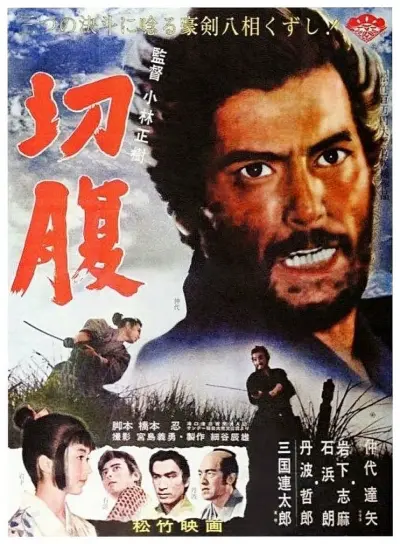
Ah, let's dive into the immersive and haunting realm of the movie "Seppuku," also known as "Harakiri" in the West. Directed by the maestro of Japanese cinema, Masaki Kobayashi, this 1962 film is a soul-stirring masterpiece that critiques the façade of honor intertwined within the rigid code of the samurai—bushido.
Set in 17th-century Japan, amidst the era where the samurais are abundant but their services are scarcely needed, we're introduced to an era of peace that leaves many warriors in poverty. The protagonist, an aging ronin named Hanshiro Tsugumo, played with heartfelt gravity by Tatsuya Nakadai, approaches the Iyi clan with a request to commit seppuku (ritual suicide) in their courtyard—a plea seemingly born from despair, yet tinted with hidden motives. But hold on, because there's so much more beneath the surface of this ostensibly simple request.
As the narrative unfolds through a series of flashbacks, so does the intricate web of lies and hypocrisy that underpin the samurai code of honor. Tsugumo's tale is intertwined with that of his son-in-law, Chijiiwa Motome, whose tragic fate catapults the film into a profound exploration of the human costs of unwavering adherence to a crumbling ethos. Motome's own encounter with the Iyi clan reveals the chilling indifference of society to the suffering of its individuals, especally when upholding an image of valor and dignity.
The genius of Kobayashi’s film lies not just in its storytelling, but in its stark black and white visuals that seem to underscore the binaries of life and death, honor and disgrace, reality and facade. The ceremonial precision and the claustrophobic setting of the Iyi house contrast sharply with the intense emotional turmoil brewing within Tsugumo, and the action, when it comes, is not about the physicality of swordplay but the shattering of illusions.
Themes of institutionalized cruelty, moral bankruptcy, and the collision between individual honor and societal norms resonate through the film’s quietly escalating tension. Kobayashi beautifully juxtaposes the visceral act of seppuku against the emotional violence inflicted by the system—both equally harrowing, both a death of sorts. It becomes a powerful allegory for any oppressive societal structure that values principles over people, to devastating effects.
"Seppuku" leaves its viewers haunted, questioning along with its protagonist the true nature of honor. Is it found in the blind following of tradition, or in the courageous defiance of an unjust system? The movie doesn't just challenge the romantic notion of the samurai; it holds a mirror to any time or society that might, in the name of values or honor, overlook the individual human tragedies at its feet. Kobayashi's film is not a comfortable watch—it's a striking, philosophical contemplation of integrity and the human spirit, and its message resonates through time, remaining relevant decades after its release.
Set in 17th-century Japan, amidst the era where the samurais are abundant but their services are scarcely needed, we're introduced to an era of peace that leaves many warriors in poverty. The protagonist, an aging ronin named Hanshiro Tsugumo, played with heartfelt gravity by Tatsuya Nakadai, approaches the Iyi clan with a request to commit seppuku (ritual suicide) in their courtyard—a plea seemingly born from despair, yet tinted with hidden motives. But hold on, because there's so much more beneath the surface of this ostensibly simple request.
As the narrative unfolds through a series of flashbacks, so does the intricate web of lies and hypocrisy that underpin the samurai code of honor. Tsugumo's tale is intertwined with that of his son-in-law, Chijiiwa Motome, whose tragic fate catapults the film into a profound exploration of the human costs of unwavering adherence to a crumbling ethos. Motome's own encounter with the Iyi clan reveals the chilling indifference of society to the suffering of its individuals, especally when upholding an image of valor and dignity.
The genius of Kobayashi’s film lies not just in its storytelling, but in its stark black and white visuals that seem to underscore the binaries of life and death, honor and disgrace, reality and facade. The ceremonial precision and the claustrophobic setting of the Iyi house contrast sharply with the intense emotional turmoil brewing within Tsugumo, and the action, when it comes, is not about the physicality of swordplay but the shattering of illusions.
Themes of institutionalized cruelty, moral bankruptcy, and the collision between individual honor and societal norms resonate through the film’s quietly escalating tension. Kobayashi beautifully juxtaposes the visceral act of seppuku against the emotional violence inflicted by the system—both equally harrowing, both a death of sorts. It becomes a powerful allegory for any oppressive societal structure that values principles over people, to devastating effects.
"Seppuku" leaves its viewers haunted, questioning along with its protagonist the true nature of honor. Is it found in the blind following of tradition, or in the courageous defiance of an unjust system? The movie doesn't just challenge the romantic notion of the samurai; it holds a mirror to any time or society that might, in the name of values or honor, overlook the individual human tragedies at its feet. Kobayashi's film is not a comfortable watch—it's a striking, philosophical contemplation of integrity and the human spirit, and its message resonates through time, remaining relevant decades after its release.

